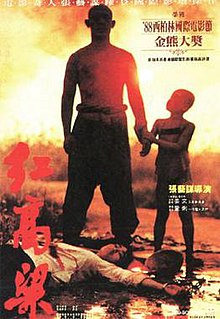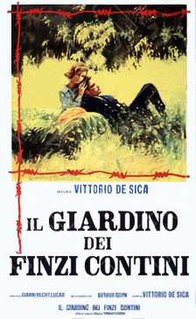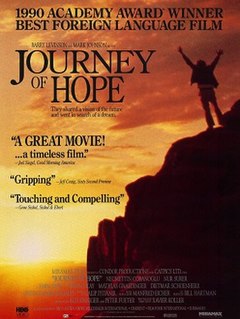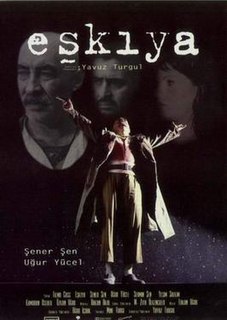
Kolya is a 1996 Czech drama film about a man whose life is reshaped in an unexpected way. The film was directed by Jan Svěrák and stars his father, Zdeněk Svěrák, who also wrote the script from a story by Pavel Taussig. Kolya earned critical acclaim and won the Academy Award for Best Foreign Language Film and Golden Globe Award for Best Foreign Language Film.

Turkish Delight is a 1973 Dutch erotic romantic drama film directed by Paul Verhoeven from a screenplay by Gerard Soeteman, based on the 1969 novel Turks Fruit by Jan Wolkers. It is a love story of an artist and a young woman, starring Rutger Hauer in his film debut and Monique van de Ven.

Red Sorghum is a 1988 Chinese film about a young woman's life working in a distillery for sorghum liquor. It is based on the first two parts of the novel Red Sorghum by Nobel laureate Mo Yan.

The Nasty Girl is a 1990 West German drama film based on the true story of Anna Rosmus. The original German title loosely translates as "The Terrible Girl."

The Garden of the Finzi-Continis is a 1970 historical drama film directed by Vittorio De Sica. The screenplay by Ugo Pirro and Vittorio Bonicelli adapts Italian Jewish author Giorgio Bassani's 1962 semi-autobiographical novel of the same name, about the lives of an upper-class Jewish family in Ferrara during the Fascist era. The film stars Lino Capolicchio, Dominique Sanda, Helmut Berger, Romolo Valli, and Fabio Testi in his breakthrough role.

Journey of Hope is a 1990 film directed by Xavier Koller. It tells the story of a Turkish Alevi family trying to illegally emigrate to Switzerland, a country they know only from a postcard. The film is a co-production between companies in Switzerland, Turkey and the United Kingdom.

Dry Summer is a 1964 black-and-white Turkish drama film, co-produced, co-written and directed by Metin Erksan based on a novel by Necati Cumalı, featuring Erol Taş as a tobacco farmer, who dams a river to irrigate his own property and ruin his competitors. It is also available in an English dubbed U.S. theatrical release titled Reflections produced by William Shelton and edited by David E. Durston.
Aviya's Summer is a Hebrew-language book that became a bestseller. The 1985 autobiographical novel by theater actress Gila Almagor was made into a film released in 1988. The 96-minute film acts as a memoir of Almagor's childhood and provides insights into Israeli society in the early post-state period. The film was shot on location in Kfar Avraham, Petach Tikvah, Israel.

Juliane Köhler is a German theatre, television and film actress. She was born in Göttingen to a puppeteer. During the period from 1985 to 1988, she studied under Uta Hagen in New York City and attended HB Studio. She also received ballet instruction in Munich. Since her first appearance at Hanover's Lower Saxon State Theatre in 1988, she has regularly appeared in German theatre productions. She performed in an ensemble cast of the Bavarian State Theatre during 1993–1997. She left the company because her filming of Aimée & Jaguar interfered with rehearsals for a production of Das Käthchen von Heilbronn. She later returned to Munich to participate with the Munich Kammerspiele.

The Bandit is a 1996 Turkish film written and directed by Yavuz Turgul and starring Şener Şen and Uğur Yücel.

Wartime Romance is a 1983 Soviet film directed by Pyotr Todorovsky. It tells the story of a soldier and a nurse separated by World War II and briefly reunited in 1950.

Hope and Pain is a 1988 Japanese film directed by Yoji Yamada. It was Japan's submission to the 61st Academy Awards for the Academy Award for Best Foreign Language Film, but was not accepted as a nominee. It was also entered into the 39th Berlin International Film Festival.

Lili Marleen is a 1981 West German drama film directed by Rainer Werner Fassbinder that stars Hanna Schygulla, Giancarlo Giannini, and Mel Ferrer. Set in the time of the Third Reich, the film recounts the love affair between a German singer who becomes the darling of the nation, based on Lale Andersen, and a Swiss conductor, based on Rolf Liebermann, who is active in saving his fellow Jews. Though the screenplay uses the autobiographical novel Der Himmel hat viele Farben by Lale Andersen, her last husband, Arthur Beul, said the film bears little relation to her real life.
Hark Bohm is a German actor, screenwriter, film director, playwright and former professor for cinema studies. He was born in Hamburg-Othmarschen and grew up on the island Amrum. His younger brother was the actor Marquard Bohm, who starred in some of his early films. He is most notable for his long-time collaboration with Rainer Werner Fassbinder.

o.k., sometimes spelled O.K., is a 1970 West German anti-war film directed by Michael Verhoeven. It was chosen as West Germany's official submission to the 43rd Academy Awards for Best Foreign Language Film, but did not receive a nomination. The film was also entered into the 20th Berlin International Film Festival. However, the competition was cancelled and no prizes were awarded, over controversy surrounding the film.

Honey is a 2010 Turkish drama film directed by Semih Kaplanoğlu, the third and final installment of the "Yusuf Trilogy", which includes Egg and Milk. It premiered on 16 February 2010 in competition at the 60th Berlin International Film Festival, where it became the third Turkish film, after Susuz Yaz in 1964 and Head-On in 2004, to win the Golden Bear award. The film, which went on general release across Turkey on 9 April 2010, was selected as Turkey's official candidate for the Best Foreign Film Oscar at the 83rd Academy Awards but it did not make the final shortlist.

Uwe Bohm was a German actor. He appeared in more than 100 films and television shows from 1973 to 2020.
Teenagers is a 1961 Egyptian drama film directed by Ahmed Diaeddin. The film was selected as the Egyptian entry for Best Foreign Language Film at the 33rd Academy Awards, but was not accepted as a final nominee.

In Bloom is a 2013 Georgian drama film directed by Nana Ekvtimishvili and Simon Groß. It is a bildungsroman focused on the friendship between two teenage girls in 1992, after the independence from the Soviet Union. The film premiered at the 63rd Berlin International Film Festival, winning the C.I.C.A.E. Prize. It was selected as the Georgian entry for the Best Foreign Language Film at the 86th Academy Awards. Variety defined it as "an intimate drama about two very young woman destined by differences of class and character for very different fates, and also as a portrait of a fascinating period in the country's social history". The artistic style is influenced by post-communist Romanian cinema, particularly by cameraman Oleg Mutu, who also worked on 4 Months, 3 Weeks and 2 Days (2007).

The Summer of Sangailė is a 2015 romantic teen drama film written and directed by Alantė Kavaitė. It was screened in the Panorama section of the 65th Berlin International Film Festival. The film won the directing award in the dramatic world cinema category at the 2015 Sundance Film Festival. It also won Best Film, Best Actress and best set design at the Silver Crane Awards. The film was selected as the Lithuanian entry for the Best Foreign Language Film at the 88th Academy Awards but it was not nominated.
















